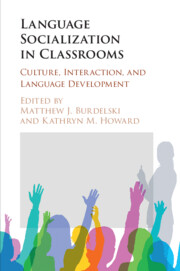Book contents
- Language Socialization in Classrooms
- Language Socialization in Classrooms
- Copyright page
- Dedication
- Contents
- Figures
- Tables
- Contributors
- Acknowledgments
- Transcription Conventions
- 1 Introduction
- Part I Socializing Values, Dispositions, and Stances
- Part II Socializing Identities
- Part III Language Socialization and Ideology
- 9 The Morning Assembly
- 10 Embodiment, Ritual, and Ideology in a Japanese-as-a-Heritage-Language Preschool Classroom
- 11 Talking about Lunch
- Part IV Conclusion
- Index
- References
11 - Talking about Lunch
Diversity, Language, and Food Socialization in a Danish Kindergarten Classroom
from Part III - Language Socialization and Ideology
Published online by Cambridge University Press: 10 February 2020
- Language Socialization in Classrooms
- Language Socialization in Classrooms
- Copyright page
- Dedication
- Contents
- Figures
- Tables
- Contributors
- Acknowledgments
- Transcription Conventions
- 1 Introduction
- Part I Socializing Values, Dispositions, and Stances
- Part II Socializing Identities
- Part III Language Socialization and Ideology
- 9 The Morning Assembly
- 10 Embodiment, Ritual, and Ideology in a Japanese-as-a-Heritage-Language Preschool Classroom
- 11 Talking about Lunch
- Part IV Conclusion
- Index
- References
Summary
This chapter offers a language socialization view on everyday experiences with food in an ethnically diverse kindergarten classroom in Copenhagen, Denmark. It examines discursive encounters that take place between teachers and children during the social activity of lunch, focused primarily on rye bread. It analyzes the ways in which teachers, children, and parents are positioned, using Goffman’s (1981) “production format,” in order to understand how teachers and children occupy different speaker positions, and how teachers attempt to socialize parents through the children. It also looks at the discursive practice of accounts, or social actions expected and presented in the case of unexpected and (often) dispreferred actions (e.g., not bringing Rye bread in one’s lunchbox). It shows how the children presented accounts in numerous cases, yet these were often treated as illegitimate by teachers. The chapter adds to research on food socialization in classrooms under conditions of migration by focusing on the vital role of language and demonstrating the difficulties that emerge when (what is seen as) non-compatible food understandings meet in classrooms.
- Type
- Chapter
- Information
- Language Socialization in ClassroomsCulture, Interaction, and Language Development, pp. 224 - 246Publisher: Cambridge University PressPrint publication year: 2020
References
- 3
- Cited by

